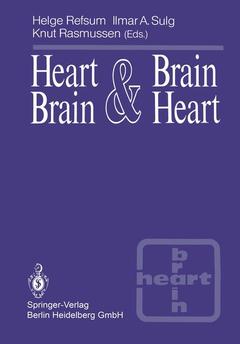Description
Heart & Brain, Brain & Heart, Softcover reprint of the original 1st ed. 1989
Coordinators: Refsum Helge, Sulg Ilmar A., Rasmussen Knut
Language: English
Subjects for Heart & Brain, Brain & Heart:
Keywords
Bypass; Nervous System; adenosine; cardiac function; cardiovascular; cells; heart rate; neurology; neurosurgery; opioid; pathophysiology; physiology; surgery; tissue
Publication date: 07-2013
470 p. · Paperback
470 p. · Paperback
Description
/li>Contents
/li>
This book focuses on the important relationship between the heart and brain in medical practice. The brain and nervous system may cause or influence heart disease, for instance by causing arrhythmias or modifying the response to ischemia. Disorders of the heart and circulation may in turn cause brain damage, for instance by releasing emboli resulting in cerebral infarction. Frequently, the brain and heart are both targets of the same disease process. They both have electrophysiologically active cells, and the responses to these cells to disease and various interventions have several similarities. Many drugs affect both organs and have mutual negative side-effects. With the increasing subspecialization in medicine, it is important to offer a work that integrates basic and clinical aspects of cardiology, neurology, cerebrovascular surgery and neurosurgery. This cross-fertilization of subject areas will broaden horizons and advance both understanding and practice.
1. Spasm of Cerebral and Coronary Vessels: Effects of Calcium Antagonists.- 2. Opioid Peptides and the Cardiovascular System with Especial Reference to Low Perfusion States.- 3. Cardiac and Cerebral Effects of Local Anesthetics.- 4. Neurotoxins as Tools in Studying Cardiac Excitation-Contraction Coupling.- 5. Adenosine and ATP Interactions with Autonomic Neural Control of the Heart.- 6. Sympathetic Influences on Arrhythmogenesis in the Ischemic Heart.- 7. Sympathetic Nervous System and Malignant Arrhythmias: Evidence for Further Links.- 8. Modulation of Cardiac Arrhythmias by the Autonomic Nervous System.- 9. Supraventricular Tachycardia and the Autonomic Nervous System.- 10. Heart Rate Changes and ECG Rhythm Disturbances in the Cluster Headache Syndrome.- 11. Blood Pressure Assessment in a Broad Chronobiologic Perspective.- 12. Mechanisms of Syncope and of Sudden Death Due to Ventricular Tachyarrhythmias.- 13. Possible Role of the Fear Paralysis Reflex in Sudden Cardiac Death.- 14. Some Clinical Neurological Aspects of Syncope.- 15. Differential Diagnosis in Syncope and Epilepsy: Clinical Neurophysiological and Cardiological Aspects.- 16. Thromboembolic Complications in Atrial Fibrillation.- 17. Echocardiography and Embolic Sources in the Heart.- 18. 31P Nuclear Magnetic Resonance Spectroscopy of Cerebral and Cardiac Ischemia.- 19. Oxygen Radicals in Heart and Brain Tissue Injury.- 20. Prevention of Ischemic Brain Damage Following Cardiac Arrest.- 21. Influence of Sleep, Activity and Circadian Rhythm on Heart Rate, QT Interval and Cardiac Arrhythmias.- 22. Pulmonary Hemodynamics in Obstructive Sleep Apnea Syndromes.- 23. Sleep Apnea Syndrome as an Occupational Disease.- 24. Concomitant Manifestations of Disease in the Cardiovascular and Nervous System: An Overview.- 25. Cardiac Involvement in Kearns-Sayre Syndrome.- 26. Some Neurological and Hereditary Aspects of Progressive External Ophthalmoplegia and Mitochondrial Encephalomyopathy.- 27. Neurological and Cardiological Findings in Systemic Lupus Erythematosus.- 28. High Altitude Physiology and Pathophysiology: Medical Observations During the Norwegian Mount Everest Expedition.- 29. Heart and Brain Under Hyperbaric Conditions in Man.- 30. Effects of Positive End-Expiratory Pressure Ventilation on Intracranial Pressure and Cerebral Blood Flow.- 31. Positive End-Expiratory Pressure and Cardiac Function: The Role of Extraventricular Constraint.- 32. Neuromonitoring in High Risk Surgery: Physiological Tolerance Limits for Central Nervous System.- 33. Monitoring Brain Function During Cardiovascular Surgery: Hypoperfusion vs Microembolism as the Major Cause of Neurological Damage During Cardiopulmonary Bypass.- 34. ’ Cerebral Blood Flow During Cardiopulmonary Bypass.- 35. Cerebral Hemodynamics During Nonpulsatile Cardiopulmonary Bypass.- 36. Cerebral Outcome After Open Heart Surgery: A Long-term Multidimensional Follow-up of Valvular Replacement Patients.- 37. Cerebral Protection During Open Heart Surgery: Clinical, Psychometric, Enzymological, and Radiological Data.
© 2024 LAVOISIER S.A.S.
These books may interest you

Inflammation and Stroke 52.74 €



